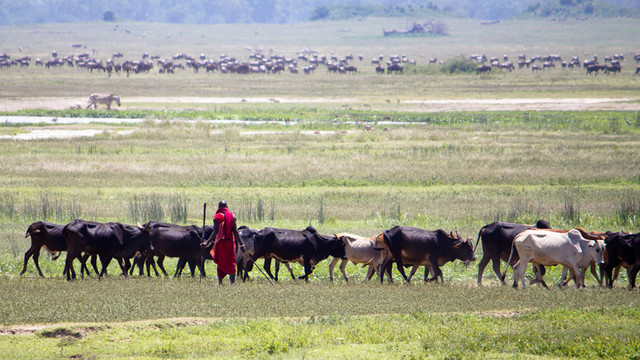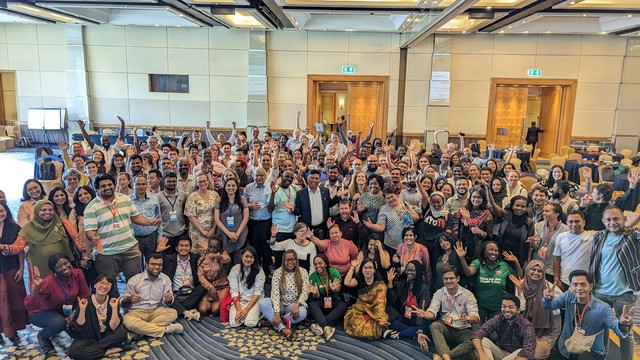Q&A: Are you ready for the Dragon’s Den at CBA14?
Dorice Bosibori Moseti of SDI won the Dragon’s Den competition at the 2019 International Conference on Community-based Adaptation. We talked to her about what she learned, and what she has been doing since.

Dorice used money that she raised to buy tools for her enterprise, called Trash to Cash. (Photo: Copyright Dorice Bosibori Moseti)
For over 15 years, ther vibrant and growing community-based adaptation (CBA) community of practice has come together to develop practical, innovative, locally-driven initiatives to support communities adapt to climate change. But these initiatives need funding.
The Dragon’s Den sessions have become a highlight at the annual conferences. Participants work in teams to develop ideas for adaption projects, create supporting business plans and learn how to make powerful investment pitches.
The sessions culminate in a competition-style plenary session where participants present their idea to a panel of people with investment experience. These ‘dragons’ ('Dragons' Den' is the name of a popular TV programme) assess the merits and viability of the pitches, seen through the eyes of investors. They offer feedback, give guidance on funding options – and pick a winner.
Last year, it was Dorice Bosibori Moseti of Slum Dwellers International who most impressed the dragons with her waste management project 'Trash to Cash'. We caught up with Dorice to find out how her project has been developing and why she’d recommend the Dragon’s Den sessions to participants at the upcoming CBA14.
The CBA Dragon’s Den is a key part of the 14th International Conference on Community-based Adaptation (CBA14), which will take place from 21-25 September 2020. Find out more about the programme and register.
On 2 September, we held a an information-sharing event hosted by the expert trainers who will be leading the CBA14 Dragon’s: read about the introduction to the Dragon’s Den.
Q: Your Trash to Cash proposal was the winner of CBA13’s Dragon’s Den. Have you been able to turn your proposal into a project?
DBM: Yes! My Trash to Cash idea tackled the problem of unmanaged waste in the slum of Mukuru in Nairobi, Kenya where I live. Unmanaged waste leads to many problems, including polluted water and poor sanitation to name a few.
The burning of waste, especially plastic, deepens Mukuru’s air pollution problem which is a major cause of premature death and disease. In the mornings and at night, acrid toxic smoke fills the air. And as climate change brings heavier and heavier rains, drains clogged with waste cause households to flood and sewage to overflow.
My waste management idea included ways to prevent flooding (household waste collection, sorting waste at source, cleaning drains) and recycling plastics. But that’s all it was – an idea. After I won Dragon’s Den I could see there could be real investor interest. I wanted to make this idea real.
During the session we looked at the practicalities of funding projects – looking at different funding options and matching pitches to the right finance sources. But I realised I still had some gaps. Our group mentor said to me: “Your idea is good. How much money do you need to get this off the ground?” I didn’t know!
I realised I needed to refine what I’d learnt and work out exactly how much I needed. I’d drafted a business plan in the Dragon’s Den sessions, but this needed tightening up. When I got back to Mukuru I enrolled on a three-month online business training course. Now I have a clear, 31-page business plan.
Q: Have you been able to raise money and develop your project?
DBM: Our Trash to Cash business is based on a mindset shift that views trash as an opportunity to develop a viable business enterprise. The business is owned by Ladies of Hope CBO, which has 12 shareholders and is governed by a project committee.
Our business will offer an integrated waste management mechanism comprising waste classification, recycling, waste disposal, waste treatment, on-site management, and turning waste to energy.
We will fully embrace the concept that is the circular economy, where companies and individuals can use our recycled products. Society can no longer exploit our scarce natural resources – as this will only lead to an unsustainable future.
Q: What did you do when you got back to Nairobi after CBA13 – how did you get people interested?
DBM: After the CBA13 conference I was so excited that I arranged meetings with women in our community. I told them of the Trash to Cash idea and told them how we can work together. I thought it would be difficult to convince my group – it was easy and they agreed to work with me to achieve the goal.
Q: How did you raise money through crowdfunding?
DBM: I applied for a circular economy competition and I was selected to participate in Mombasa where we were trained to pitch and we were given an M-Pesa pay bill to crowdfund for a period of 30 days. It was hard to raise the cash, but I managed to get the US$2,000 and leap2 merged the other half.
Q: What did you buy with the money?
DBM: We bought 11 dust coats, gumboots, 15 spades, 25 rakes, other tools, five wheelbarrows, two carts and a store.
Q: How many people you are working with?
DBM: Women are involved in sorting waste and we can manage to employ four women three times a week. Others come in just for one day, when we are taking out the waste to be taken to the factory.
We sort different waste carton boxes, white paper, shoes, light iron, pipes, and plastic. Our team are also involved in weekly clean-ups that we do with other community members.
Q: What did you enjoy most about the Dragon’s Den?
DBM: The organisation of the session was great – running through the problem, thinking through the intervention, and then coming up with the solution. Then, working up your business idea and ways to make that business attractive to investors. Each of these simple and logical steps really helped frame your proposal.
Preparing the PowerPoint presentation of my pitch was also incredibly useful – I hadn’t used PowerPoint before. When I took to the stage to present, I could talk through each aspect of my proposal. It made me realise that you can have a great idea – but you need the right documents and material to back it up. Especially when you’re standing on a stage in front of 300 people!
It was also great getting to know the people in your group – listening to the different challenges that communities are facing, coming up with proposal ideas, working out what the funding challenges would be, how to get around them. And I learnt a lot from the mentors – they all had direct experience of working with investors and donors so had valuable insights to share.
They explained that investors need clarity on how their money will be spent and the risks. And, of course, what their potential returns will be. It was useful understanding why all this information is crucial, particularly for private investors.
Q: How did you impress the dragons?
DBM: Climate change is exacerbating problems in Mukuru. My project can’t stop the slums from flooding when the heavy rains come, and it can’t eradicate the pollution. But it showed how communities can work together to manage waste and at the same time go some way to help manage the knock-on effects of climate change.
I had lots of questions from the dragons about my plans for involving people all across the community – particularly women and youth. They seemed impressed by this.
Q: What was the most useful lesson from taking part?
DBM: Investors want to see the business plan. If your business plan isn’t clear, doesn’t show clear ways of making a profit, and the numbers don’t add up, no partners can invest.
It was very clear that when you pitch you need to know who will be your customer, how much you will need in the business and what will you get from the business. And most important, what change are you bringing in and for this it was impacting on climate change mitigation by cleaning and opening rivers and drains reducing burning of waste.


